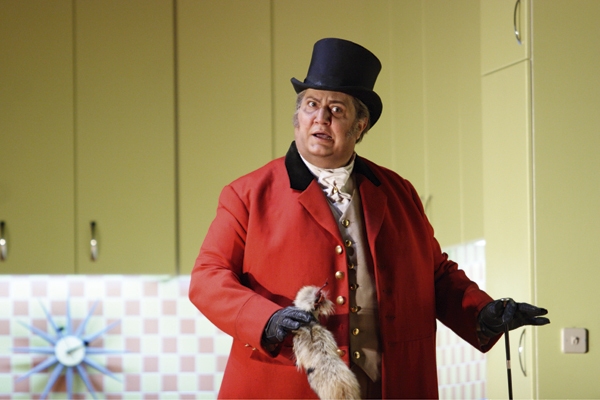It’s taken me a shockingly long time to realise how great Verdi’s Falstaff is, and I still wouldn’t agree that it is his greatest opera, which fully paid-up Verdians tend to think. It may be a measure of my progress, though, that I got a lot of pleasure out of the new production at Covent Garden, by Robert Carsen, even while recognising that it is a shallow, wilfully unsearching account of a work much of whose magic is extraordinarily subtle, not only for Verdi, but for anyone.
Carsen’s production, and the musical side, too, are on a level with the Shakespeare play from which Falstaff derives, which is agreed by everyone to be a potboiler. Verdi and his librettist Boito were interested in the class aspects of the intrigues and humiliations and triumphs of the characters, but still more interested in Falstaff’s anguished ageing, and in his understanding, like Wilde after him, that the tragedy of age is not that we grow old but that we remain young. This is not explored at all in Carsen’s production, which is far more notable for the 1950s sets designed by Paul Steinberg and the costumes by Brigitte Reiffenstuel.
The curtain rises on Falstaff reposing in a huge bed surrounded by dining tables, and food is an insistent motif, though one which Boito and Verdi overlooked. Falstaff’s visit to Alice takes place in her vast and gaudy kitchen, and at the touch-and-go reconciliation of the ending, they all sit down to a feast in a non-existent Windsor Forest. Oddly, Ambrogio Maestri, who sings Falstaff — he seems to have sung it everywhere — is not particularly fat, and seems unpadded, so the jokes about his size, and his own pride in it, seem beside the point. He has a good voice, though he seems not to have been inspired on this occasion to do anything much with it, and his most famous utterances passed for little. The rest of the cast was just about adequate too, but undistinguished and mostly underpowered. The star of the show was Rupert the horse, who munched contentedly while Falstaff meditated bitterly on a world of fools and thieves. Daniele Gatti’s conducting was uneven, and the lengthy pauses between the scenes added to an overall effect of mediocrity.
Jonathan Dove seems to be turning out operas at a speed which would have impressed Donizetti. One of the latest, which received its UK première last week at the RAM, is Mansfield Park, to a text by Alasdair Middleton. To choose this particular novel of Jane Austen, with its complex and perhaps ambiguous tone, must have been tempting for so versatile a composer as Dove, with his investigations of many different kinds of story and style. How far he succeeds in this case I can’t say, largely because I could understand so small a proportion of the words. I don’t think that was the fault of the very fine cast, ten young singers of remarkable quality — but how many of them will I see again?
The six female singers have to sing vocal lines which I don’t think anyone could make intelligible, not even with the piano duet accompaniment we had at the RAM. The range of characterisation is impressive, from the hatefulness of Aunt Norris, vile even by Austenian standards, to the mildness and concern of Fanny Price and Edmund Bertram, the unlikely heroine and hero. I look forward to seeing it again, with surtitles.
Welsh National Opera has revived Yannis Kokkos’s production of Tristan und Isolde, but only for four performances. The first night was an experience of overwhelming cumulative power. Lothar Koenigs conducted a Prelude of such tempestuous intensity that I wondered what could follow, and Act I made, by a long way, the weakest impression, with the two leads seeming to save themselves, though Susan Bickley’s Brangäne was tremendous throughout.
In Act II Ann Petersen threw caution to the winds, producing an ecstatic paean to Frau Minne, and floods of glorious tone from then on, culminating in a Liebestod unlike any other I have heard and seen, devastating. Ben Heppner is the Tristan, an anxious-making choice in light of the last few performances I have heard from him. Here he cunningly used his strengths — especially a profound understanding of the role — to counter his weaknesses, which include a reduction of volume, some uncertain pitching and a tendency to crack on soft notes. It wouldn’t be unfair to say that much of Act III was speech-song, but the acting and conviction were such as to lead you to identify with Tristan in his agony. In Act II he held his own in the great duet, cut much less drastically than usual; though Tristan’s first delirium in Act III was excised, a dreadful thing to have to do.
The orchestra was on shattering form, from much chamber-music delicacy exquisitely realised to stunning climaxes, and everything in between. A performance like this guarantees a night’s lost sleep, but who would be pusillanimous enough to care?





Comments